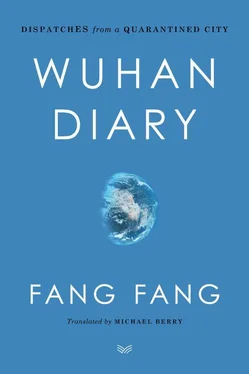Deeply ingrained habitual behaviors, like reporting the good news while hiding the bad, preventing people from speaking the truth, forbidding the public from understanding the true nature of events, and expressing a disdain for individual lives, have led to massive reprisals against our society, untold injuries against our people, and even terrible reprisals against those officials themselves (a group of high-ranking Hubei officials have already been dismissed from office, while others who should bear additional responsibility still remain in office). All this, in turn, led to the city of Wuhan’s falling under a 76-day quarantine, with its reverberations affecting untold numbers of people and places. It is absolutely essential that we continue to fight until those responsible are held accountable.
III
Beginning on January 20, Wuhan would be gripped by a cloud of fear and anxiety for the next three days as we quickly approached the quarantine order. Locking down an entire city with a population of millions in order to stop the spread of an epidemic was a historically unprecedented action. It was certainly also a very difficult decision to make on such short notice, because a quarantine order would certainly affect the lives of every citizen in Wuhan.
However, to impede the spread of this virus, the city government of Wuhan gritted its teeth and made the hard choice that needed to be made. This was also a decision that was unique in Wuhan’s thousands of years of history. But, looking at it from the perspective of how we changed the course of the virus’s spread, this was clearly the correct decision, even if it came a few days late.
During the five-day period lasting from three days before the quarantine order went into effect through the first two days after the restrictions were imposed, most people in Wuhan were in a state of utter panic. Those were five terrifying days that seemed to last forever; meanwhile, the virus was quickly spreading throughout the city, and even the government appeared as if it was at a loss as to what to do.
On January 25, Day One of the Lunar New Year, people finally started to settle down a bit. The media reported that China’s top-level leaders were closely following the outbreak in Wuhan and that the first team of medical experts from Shanghai had arrived in Wuhan. Those reports gave the people of Wuhan some solace and helped calm their spirits. That’s because everybody knows that once something in China is taken up at the national level, everyone will step up and do what needs to be done. From that day forward, the frantic and confused people of Wuhan could dispel all their fears. And that was the day that I began my diary.
But that was also when the period of true suffering arrived here in Wuhan—the number of people infected with the coronavirus exploded during the Lunar New Year. Because the local hospitals couldn’t cope with the surge of new patients, the entire system was brought to the brink of collapse. As it happens, that was precisely the period of the Chinese New Year when families normally come together for the holiday; it is a time of year that is usually filled with joy. But instead the world froze over; countless people became infected with the coronavirus, and they ended up traipsing all over the city in the wind and rain searching in vain for treatment. After the quarantine was imposed, all public transit in the city shut down, and since most residents in Wuhan don’t have their own automobiles, they had to walk from one hospital to another in search of a place that might admit them. It is hard to describe how difficult that must have been for those poor patients. That is also about the time that short videos of patients appealing for help began to appear online; there were also videos of people lining up all night long outside hospitals, hoping to get admitted, and clips of doctors on the brink of exhaustion. We all felt completely helpless in the face of these patients crying out, desperate for help. Those were also the most difficult days for me to get through. All I could do was write, and so I just kept writing and writing; it became my only form of psychological release.
Once we got through that most difficult period, several top officials in Hubei and Wuhan were removed from office, 19 provinces from all over China sent medical relief teams to provide aid to Hubei, and we constructed a series of temporary hospitals to handle the influx of patients. Eventually, the new quarantine procedures that were put in place helped to completely turn the tide away from the tragic and chaotic state that things had been in. All patients were divided up into four groups: patients with severe symptoms, confirmed coronavirus patients, suspected coronavirus patients, and those who had close contact with confirmed patients. Those with severe symptoms were admitted to the main hospitals designated to treat coronavirus patients; those confirmed patients with mild symptoms were sent to the temporary hospitals; all suspected cases were admitted to local hotels where they would be kept under quarantine; and close contacts were also quarantined in hotels or other facilities, such as school dormitory rooms. All these methods were immediately put into place and quickly began to yield results. Once they got into the hospital system, a good majority of the mild cases were able to see a quick recovery. Day after day, we were able to personally witness the situation improving here in Wuhan. You can see that gradually taking place in my diary.
During the early stage of the quarantine, the challenge of taking care of the daily needs of nine million people was taken care of by neighborhood groups that self-organized and used online services to make group purchases in order to provide daily necessities. Later the government mobilized all its civil servants to each and every community to help serve the needs of local residents. Wuhan’s nine million residents worked together to cooperate with all the government’s requests; their restraint and patience helped to ensure that Wuhan would be able to contain this virus; they are deserving of whatever recognition we can muster to acknowledge their collective sacrifice. Spending a full 76 days in quarantine was not an easy thing for people to do. But the amount of energy the government later put into the quarantine and various other measures was indeed extremely effective.
By the time I got to my 60th diary entry, the situation in Wuhan had already completely turned around. And then on April 8, the 76th day of the lockdown, Wuhan officially reopened. That was an unforgettable day. The moment the quarantine order was lifted, there was barely a dry eye in the entire city.
IV
What I never imagined was that just as the coronavirus outbreak in Wuhan was starting to ease up, the virus began to spread throughout Europe and the United States. These tiny virus droplets that are invisible to the naked eye quickly brought the world to its knees. The entire world, both East and West, were all tortured in horrific ways by this coronavirus.
Meanwhile, politicians from both sides pointed fingers at each other, while never facing up to the fact that everyone had taken missteps along the way. China’s lax attitude early on and the West’s arrogance shown in its distrust of China’s experience fighting the coronavirus have both contributed to countless lives being lost, countless families being ripped apart, and all humanity having been dealt a heavy blow.
A Western reporter asked me: “What kind of lesson should China learn from this outbreak?” My response was: “The spread of the coronavirus is not limited to China; it is something affecting everyone all over the world. The novel coronavirus has not just taught China a lesson, it has taught the entire world a lesson; it has educated all of humanity. This lesson is: Humankind cannot be allowed to continue on lost in its own arrogance, we can no longer think of ourselves as the center of the world, we can no longer believe that we are invincible, and we can no longer underestimate the destructive power of even the smallest things—like a virus.”
Читать дальше



![О Генри - Закупщик из Кактус-Сити [The Buyer from Cactus City]](/books/405348/o-genri-zakupchik-iz-kaktus-thumb.webp)








